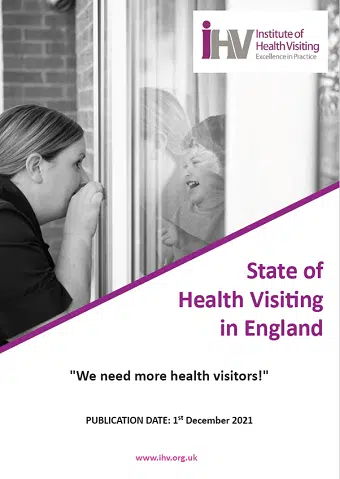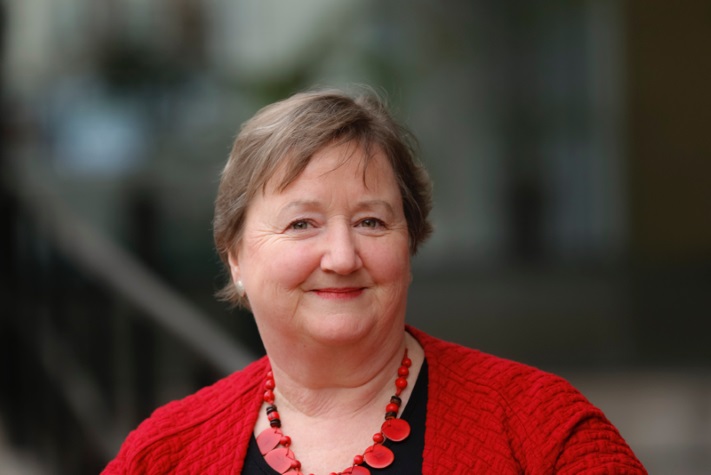The Institute of Health Visiting (iHV) publishes the findings from its annual survey ‘The state of health visiting 2021: we need more health visitors’ – capturing the experiences of frontline health visiting practitioners working with families across the United Kingdom in the wake of the COVID-19 pandemic. The findings confirm that the needs of babies, young children and families are increasing, there are not enough health visitors to meet these rising levels of need, and families are experiencing an ongoing postcode lottery of support.

The survey findings present the health visiting service’s unique view into the lives of families living through the pandemic, often hidden behind front doors and invisible to other services, with reports of soaring rates of domestic abuse, mental health problems, child behaviour problems, and child safeguarding. They tell the story of escalating numbers of families facing poverty and adversity, and due to successive years of cuts to the health visiting service in England, many families have been without access to the early help that can make a big difference.
There is a national shortage of around 5,000 health visitors in England and with services so stretched in some areas, 42% of health visitors are worried that they can’t do enough to safeguard vulnerable babies and young children. The pandemic is not over – but what is clear is that its impact on babies, young children and families is ongoing and has been significant.
Alison Morton, Executive Director at the Institute of Health Visiting, says,
“Our survey findings this year paint a picture of a health visiting service under pressure due to the impacts of the pandemic which affect the most disadvantaged families the most and increase the demand for health visiting support.
“In many areas, despite health visitors’ best efforts, the service is now so stretched that they can only reach the ‘tip of the iceberg’ of need and vulnerable babies, young children and their families are being let down.”
Over the last twelve months, health visitors have seen widening health inequalities with an increase in vulnerability and safeguarding risks with: 81% of health visitors reporting an increase in perinatal mental health problems; 80% an increase in domestic abuse; and 71% an increase in child safeguarding. In addition, 86% of health visitors reported an increase in speech, language, and communication problems; 80% an increase in child behavioural problems; and 72% an increase in poverty affecting children and families.
Alison continues:
“Becoming a parent can be challenging for a multitude of reasons. The good news is that getting help early can make a big difference. The pandemic has left many families without this vital safety net of early support provided by a health visiting service that reaches out to them. We know that many families find it difficult to take that first step in asking for help, and babies can’t ask for help if they are distressed and their parents are struggling. Therefore, it is vitally important that we have a universal health visiting service that reaches out to all families.”
Health visitors are Specialist Community Public Health Nurses who provide a vital infrastructure of support for all families, and a crucial safety-net identifying vulnerable babies and young children who are often otherwise invisible to services.
In England, the pandemic hit the profession at a time when it had the least capacity to meet families’ rising levels of need. Health visitors’ abilities to respond were compromised due to variations in local health visitor delivery models and the extent of pre-existing workforce capacity issues. Families have faced the brunt of this with a ‘postcode lottery’ of support and many health visitors are struggling to practise safely with large and unmanageable caseloads:
Only 9% of health visitors in England reported that they have the recommended ratio of 250 children aged 0-5, or less, per full time equivalent health visitor (FTE HV); compared to around two-thirds of health visitors in Scotland and Wales
Worryingly, more than 1 in 4 health visitors in England report that they are accountable for over 750 children (in Scotland and Wales, no health visitors have caseloads of this size).
As a result, many families are not seeing a health visitor at the routine health and development reviews mandated by the Government; for example, the report findings highlight that:
- Only 21% of health visitors report that they are able to offer all families the antenatal contact
- Only 21% of health visitors are able to offer all families a two-year review
Alison concludes:
“We urgently need more health visitors. Following years of cuts, the health visiting profession faces its biggest workforce challenge in living memory. Alongside 700 leading children’s organisations who supported our Spending Review call for more health visitors, we call on the Government to make good their pledge to ‘rebuild health visiting’.
“The Government say that they will maintain the Public Health Grant, but this is being maintained at a level that is too low to fund the number of health visitors needed to support all families, respond to rising levels of need and identify vulnerable babies and young children.
“Investment in health visiting is needed to provide the prevention and early intervention support to stop the well-reported growing tsunami of children in crisis. This cannot wait any longer – our nation’s children deserve better.”
The Institute of Health Visiting urges the Government to consider the implications of these findings on their plans to deliver the Start for Life vision to support families in giving their baby the best start in life.
We call on the Government to make good their pledge to ‘rebuild health visiting’ with 3 specific policy calls:
- Funding – We are calling for a £500 million ring-fenced uplift in the Public Health Grant over the next three years to reverse years of cuts, deliver the Government’s pledge to ‘rebuild health visiting’, and ensure sufficient resource to deliver the full breadth of the Healthy Child Programme of prevention and early intervention to all families. A ring-fenced grant would provide protection from political cycles of disinvestment.
- Workforce – We need 5,000 more health visitors in England with the specialist community public health nursing skills to support families through prevention and early intervention, and address a multitude of physical and mental health needs, child development priorities, social issues and safeguarding concerns which can impact on outcomes for babies and young children. Workforce forecasting, training, recruitment, and retention plans are needed to address current capacity issues and predicted losses, build leadership capability, and support succession planning.
- Quality – An end to the ‘postcode lottery’ of health visitor support. Real, meaningful accountability in public service delivery is needed to ensure that families receive personalised and effective support to improve child outcomes and reduce inequalities wherever they live. The iHV is concerned that the Budget outcome metrics for Best Start all relate to ‘education’ and that ‘health’ has been overlooked. History has shown us that ‘you get what you measure’ and, without effective levers to assure the quality of health visiting services, this will lead to further erosion of preventative public health and weaken the health visiting contribution to multiple health pathways.




